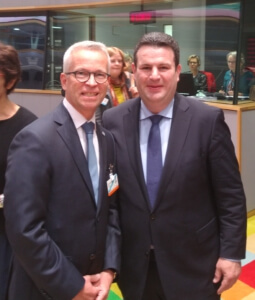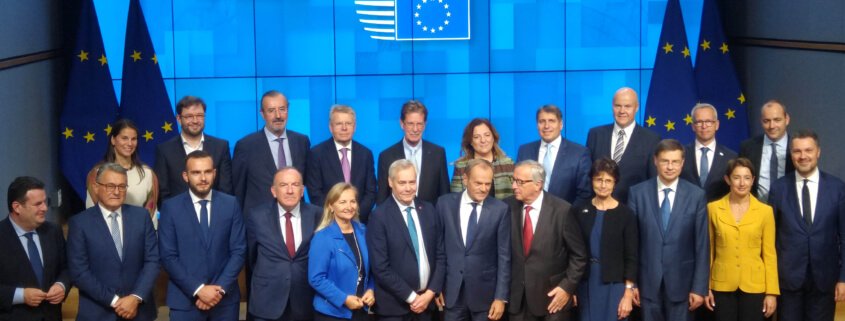Massive European re-skilling scheme needed to manage sustainability transition says President Ramme at Tripartite Social Summit
Rising geopolitical tensions, the risk of an unorderly Brexit, a rapidly warming climate and risks of an economic slowdown mark the background of this autumn’s Tripartite Social Summit in Brussels. Within this context, President Ludger Ramme calls for decisive action for our continent to become more resilient, sustainable and competent.
Unfortunately, our industrial-age education system has partly failed to equip workers and managers with the necessary skills to transition to and build a sustainable economy. More than ever, systemic, social and emotional skills are required in leadership and beyond to make sense of a world characterised by volatility, uncertainty, complexity and ambiguity (VUCA). A massive European re-education scheme is needed to support the just transition in an inclusive way – at all hierarchical levels. As highlighted in the #ManagersForFuture campaign, future leaders in business (and politics) should be equipped with the right skills to be able to operate within planetary boundaries and deliver on succeeding the sustainability revolution.
Please find the speech of Ludger Ramme at the Tripartite Social Summit on 16 October 2019 in Brussels below and as PDF here (check against delivery):

Ludger Ramme with Federal Minister of Labour and Social Affairs, Hubertus Heil
***
Dear Presidents, dear participants,
My name is Ludger Ramme and I am honored to address you as the President of CEC European Managers. I am representing today the Liaison Committee, together with Eurocadres, giving voice to more than 6 million managers and professionals throughout Europe.
Thinking about tomorrow, the political agenda of President-elect von der Leyen stands out for its ambition: firmly embarking the sustainability revolution to reach the target of limiting global warming to 1,5 degrees as identified by the IPCC.
If the first decades of this century have been the ones of raising awareness, the next one must be the decade of action. As a growing number of social groups demand, starting with our children and grandchildren, time has come for Europe to take the lead in countering climate change. The challenge of sustainability – ensuring future growth in a context of limited resources – brings along systemic changes, which need competences in systemic thinking that are however still scarce. Collectively, leaders in business, politics and social partner organisations have to change. We have to change our personal behavior and our concept of living.
We need a massive and inclusive European re-skilling scheme to manage the sustainability transition.
The multiple changes that the sustainability revolution will impose on us cannot be accomplished without the support of all layers of our societies. Figures show that the most vulnerable groups are already paying the highest price of climate change, yet it is them who are the most scared by the need of change and may suffer from badly designed transition policies. That’s why we need a just transition that includes everyone and leaves nobody behind: we are all responsible to make it work – together.
We will have to identify new tools to manage our natural and human resources, with a specific attention on the interaction between human and artificial intelligence; we have to use digitalisation more purposefully; we need to start measuring how our policies really contribute to a well-being-oriented economy.
But sustainability is not only about the environmental or economic dimension: we have to respond to the societal challenges that change brings along; we have to invest in our schools and VET to overcome the single capital growth paradigm we are currently stuck in.
But above all, we need courage and sustainable leadership, as we are highlighting with our #ManagersForFuture campaign. Dear Presidents, dear participants, we have the responsibility to make the sustainability revolution actually work.
And as we show with our campaign, European managers are ready to do their part.
Let me close by thanking the outgoing teams present in this room today. President Tusk, President Juncker, Commissioner Thyssen, your commitment to the European project has been remarkable. In particular, we would like to salute the attention shown to the social dimension of our Union.
Thank you for your attention and farewell.



